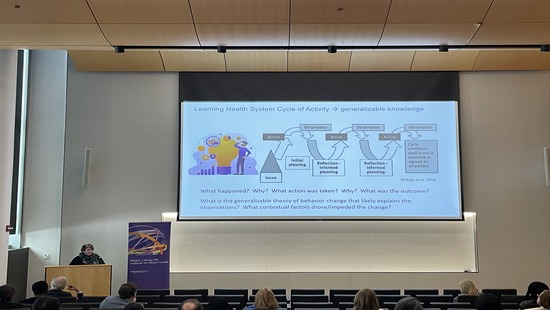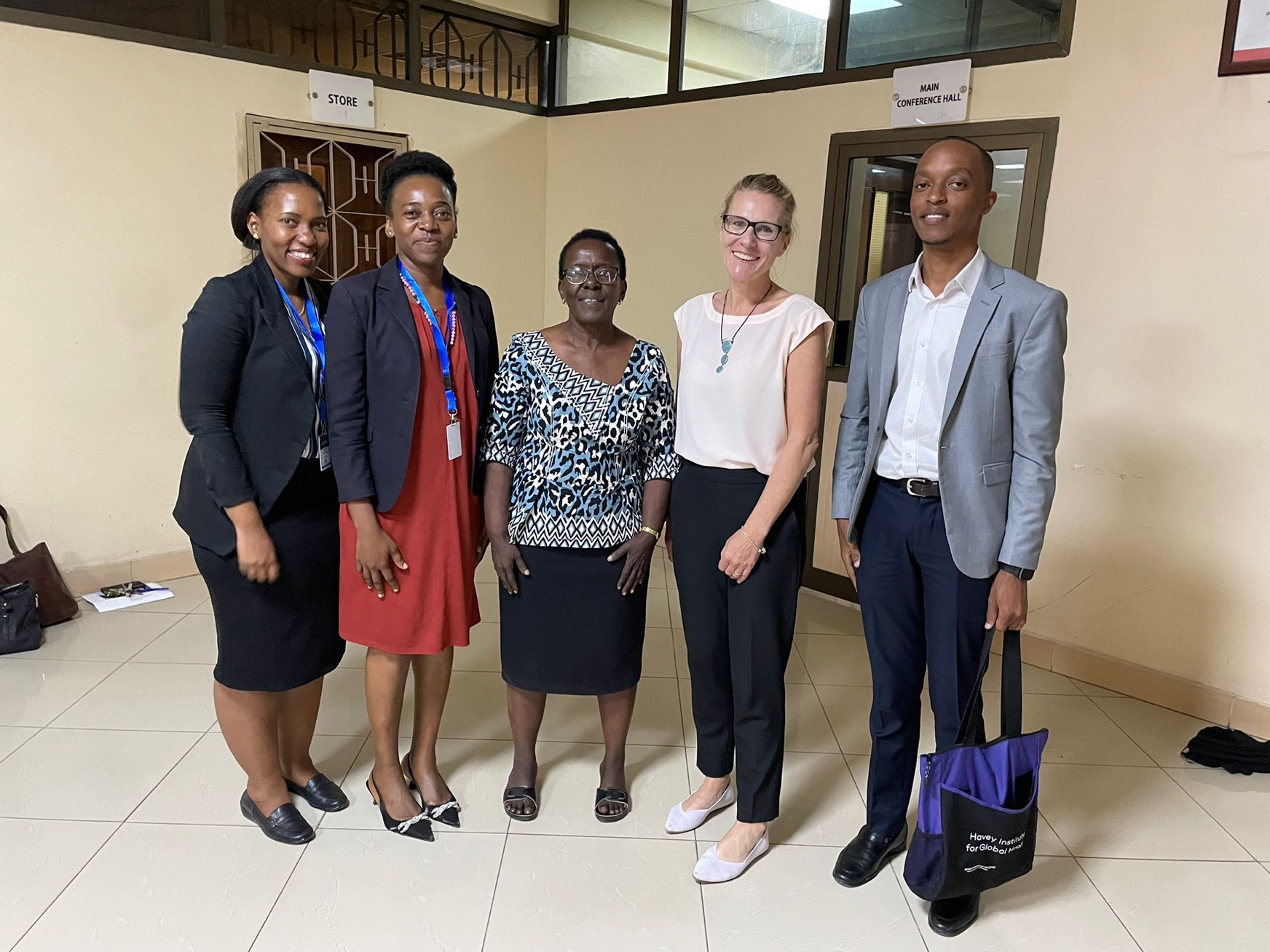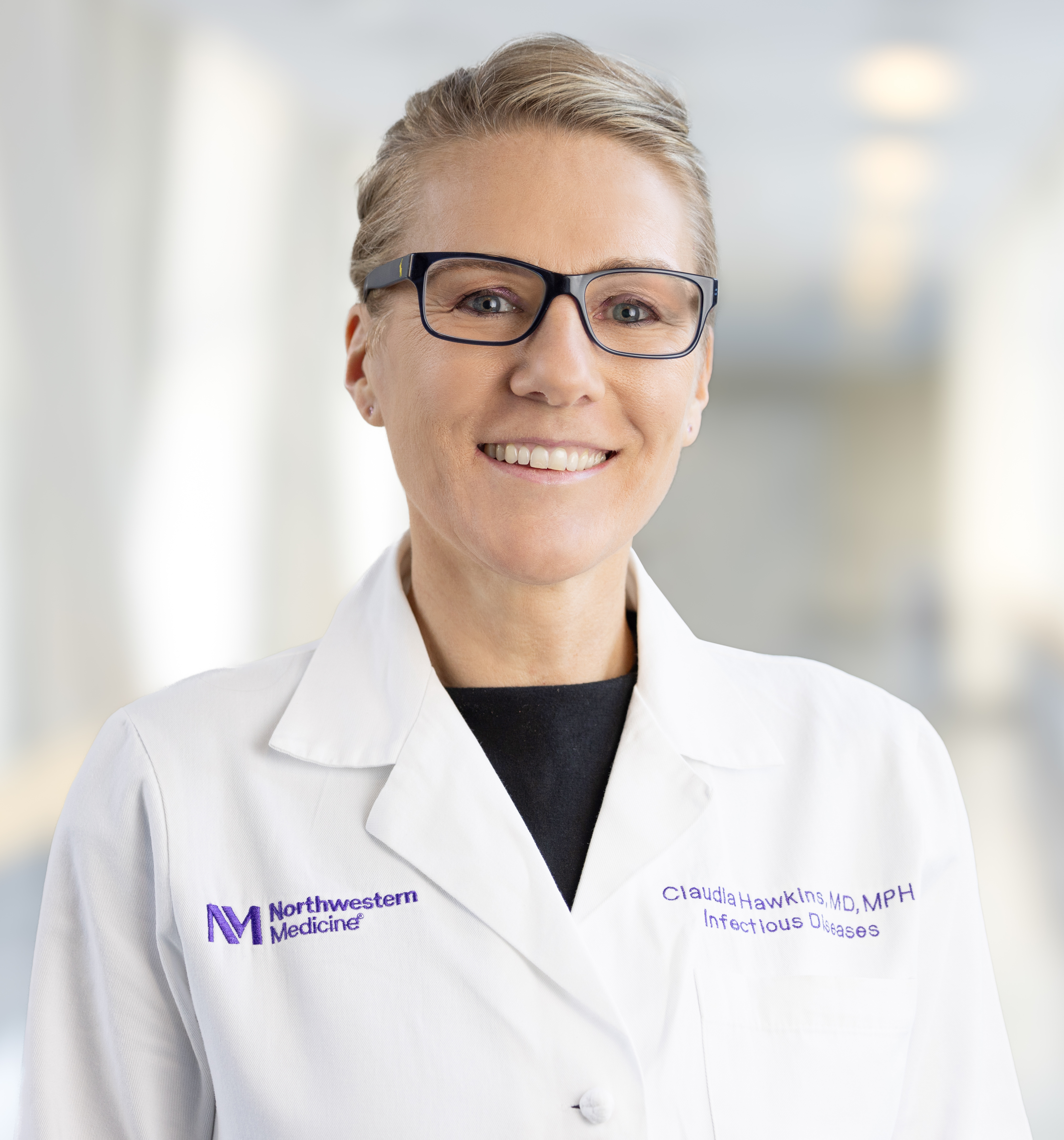Gravitt Discusses Cancer Health Disparities Research

When word of a communicable disease outbreak hits our news feeds, exactly how the public manages its spread and, hopefully, treatment, is due in no small part to the efforts of research capacity building work like that being done by the Havey Institute for Global Health Center for Communicable and Emerging Infectious Diseases.
“One of the goals of our center and part of our mission is to prepare the next generation of global health leaders in communicable and emerging infectious diseases through rigorous research, training and capacity building programs,” says Claudia Hawkins, MD, MPH, director of the Center for Global Communicable and Emerging Infectious Diseases. “Our work therefore involves researchers at all stages of their careers, ranging from pre- and post-doctoral students and trainees through established scientists.”

Members of the Center for Communicable and Emerging Infectious Diseases attend a symposium in Tanzania.
Research capacity is built through many pathways, including research training, knowledge exchange, and the development and maintenance of research infrastructure, all with the goal of supporting self-sustaining research environments with the resources to conduct high-quality research. At Northwestern, this involves partnering with interdisciplinary investigators which includes medical doctors, epidemiologists, social scientists, laboratory scientists and engineers from all over the world.
Through the center, research includes collaborators from several different disciplines at Northwestern including the Division of Infectious Diseases (adult and child), the Departments of Medical Social Sciences, Preventive Medicine, Bioengineering, and the Kellogg School of Management. In addition, Northwestern partners with scientists from other academic institutions both in the United States and internationally, as well as industry partners and local and international NGOs.
Though much of the work is conducted in sub-Saharan Africa, with strong ties in Nigeria, Mali, Tanzania and Southern Africa, the impact this research has is borderless.
“Every year, malaria, HIV and tuberculosis (TB) kill more than 2.8 million people,” Hawkins explains. “And more than 1.7 billion people require treatment for at least one neglected tropical disease (NTD).”
One of the goals of our center and part of our mission is to prepare the next generation of global health leaders in communicable and emerging infectious diseases through rigorous research, training and capacity building programs.”
- Claudia Hawkins, MD, MPH, director of the Center for Global Communicable and Emerging Infectious Diseases

The Center for Communicable and Emerging Infectious Diseases supports several different research training programs. These include programs supported by Fogarty International Center, U.S. National Institutes of Health (NIH) that aim to strengthen human capacity to conduct research in HIV, TB and other Communicable Diseases and some non-infectious conditions. These programs, which are led by Northwestern faculty and collaborators at international partner institutions have supported and trained hundreds of pre- and post-doctoral scholars in communicable disease and related areas over the past decade. Several of these scholars have been supported through formal degree programs where they have had the opportunity to take some of their classes at Northwestern and receive mentoring from Northwestern Faculty from several different disciplines across the university.
Two novel training programs include the Applied Malaria Modeling Network (AMMNet) which works to upskill local analytical capacities in epidemiological modeling to support countries in becoming self-sufficient in analytics to support decision-making, as well as The Center for Innovation in Point of Care Technologies for HIV/AIDS (C-THAN) which supports the development and facilitates commercialization of a pipeline of point-of-care technologies designed to meet the clinical needs of people who live with HIV/AIDS in low- and middle-income countries.


“The large majority of these communicable diseases affect low- and middle-income countries,” Hawkins says. “Supporting the development of a self-sufficient and adequately resourced research workforce is critical in ensuring countries disproportionately affected by communicable diseases are able to internally evaluate disease burden and propagating factors in their setting and inform the development of evidence-based policies and interventions at both the community and national level.
“The ultimate goal of our communicable diseases research capacity-building programs is to help institutions build a sound scientific research base from which they can contribute to local knowledge creation, inform and guide public health policy and healthcare services planning and ultimately enhance the quality of patient care,” Hawkins says.
Current international research training grants at Northwestern
National Institutes of Health-funded international research training grants, known as D43s, are intended to develop and strengthen scientific leadership and expertise in global health research at low-and middle-income country institutions. D43 grants support research training programs for US and international students and professionals to strengthen research capacity and encourage international collaboration.
Multidisciplinary NeuroAIDS Research and Training Program to Improve HIV Outcomes in Nigeria and Africa
PIs: Philip Gorelick (formerly Babafemi Taiwo), Olayinka Olusola Omigbodun
HIV-related brain disorders (NeuroAIDS), including mental health, neurocognitive, and neurological problems, remain common globally. This project aims to develop scientists at the University of Ibadan, Nigeria (UI) to improve the brain health of people living with HIV. Over the past 10 years, the Multidisciplinary NeuroAIDS Research and Training Program to Improve HIV Outcomes has developed new NeuroAIDS research capacity at UI in three interacting cores: the Mental Health Core, Translational and Clinical Sciences Core, and the Neuropsychological Infrastructure Core.
Building capacity for patient-centered outcomes research (PCOR) to improve the quality and impact of HIV care in Tanzania
PIs: Claudia Hawkins Lisa Hirschhorn
The HIV Patient-Centered Outcomes Research (PCOR) training program is a collaboration between Northwestern University and Muhimbilli University of Health and Allied Sciences (MUHAS) in Tanzania. The program aims to build capacity among Tanzanian investigators to lead PCOR in HIV disease prevention, care and treatment and HIV-related comorbidities. The program fosters timely and clinically relevant patient-centered research designed to measure and improve clinical and patient-centered outcomes, while strengthening established collaborations between researchers at MUHAS and Northwestern University.
Partnership for Global Health Research Training Program (HBNU)
NU PI: Claudia Hawkins
The HBNU Fogarty Global Health Training Program, a consortium of Harvard University, Boston University, Northwestern University and the University of New Mexico, aims to continue to contribute to global health research capacity building and the use of research to improve the health outcomes related to priority health areas in low- and middle-income countries (LMICs) in partnership with 18 sites throughout Africa, Asia, and South America. HBNU recruits US and LMIC trainees to strengthen global health research networks and programs at academic institutions and ultimately help sustain global health research in the US and LMICs.
Building the Next Generation of Researchers in TB/HIV Diagnostics in Mali (B-NextGen)
PIs: Robert Murphy, Almoustapha Issiaka Maiga, Mariam Sylla
Mali is a low-income country in Sub-Saharan West Africa where the incidence of mycobacterial infections, primarily tuberculosis, remains high, driven in large part by the persistence of the HIV epidemic with TB being the main cause of death in HIV-infected adults and children. The overarching goal of this research training program is to strengthen the scientific capacity to develop and implement diagnostic and monitoring technologies to address the HIV and TB epidemics. This program seeks to achieve the overall goal of training the next generation of scientists and leaders in diagnostics of HIV and mycobacterial diseases in Mali and the region.
Claudia Hawkins, MD, MPH is a member of Robert J. Havey, MD Institute for Global Health, Institute for Public Health and Medicine (IPHAM), and Northwestern University Clinical and Translational Sciences Institute (NUCATS).
To learn more about the Center for Global Communicable & Emerging Infectious Diseases, visit their website.
For details on events, news, and funding opportunities, sign up for the Havey Institute for Global Health newsletter.

